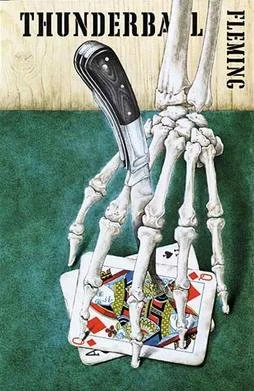Thunderball

Thunderball
By Ian Fleming
It seems the year 1961 saw many new changes for writer Ian Fleming. Almost 10 years after his experiences in Naval Intelligence and his wild imagination gave birth to the master spy character James Bond in the debut novel Casino Royale, his book sales were skyrocketing to an all time high with even John F. Kennedy listing one of his novels (From Russia with Love) as one of his top favorite books. He had already had film success with a TV movie adaptation of Casino Royale, but in June 1961, he would sell the rights to all of his 007 stories, which would lead to the 1962 blockbuster Dr. No.
But that same year, there would be another screen story with which Fleming would deal-- this one a title called Thunderball. Originally developed as a script between Fleming and two colleagues, Fleming took his 3-month holiday at Goldeneye in Jamaica to develop a novelization of it which would later become the Thunderball novel-- a tale that would cause a few months' long legal battle before it could reach publication when his colleagues sued him for the rights.
Knowing the background of the piece, I can say that it definitely makes much more sense since this novel reads differently than the previous books in the series. While Bond has developed as a character from a ruthless government operative to more of a keen man for justice, this is probably the first book since From Russia with Love that bothers to delve more into scenes with enemy planning. He sets the entire thing up like a mystery novel where the reader is always one step ahead of the main characters and hoping that they'll catch up quickly. It produces a sense of urgency in the reader by doing that but, in some aspects, tends to let the air out of any surprises there might be.
I could definitely tell that Fleming must have had a lot of fun with this because it reads bigger and more daring, as if he's finally relaxed with his success enough to further complicate the hell out of his plot. He does a beautiful job of crafting a theme of trust, specifically pinpointing that it can be quite difficult to determine who is worthy of it and who is not when we need to rely on someone. It raises the question of whether we can even trust another person with such a power as that of the atomic (or even nuclear) weapon. There's always something that won't go according to plan or something that might even skew our judgment. Something that might even lead us to question the trust we put in ourselves.
But where this novel falters seems to be in its execution with both its not so great editing and the rushed ending. Perhaps if Fleming had taken more artistic liberties with creating the novelization and given it another edit, Thunderball might have that much more of the nail biting excitement so characteristic of his other works, thus drawing in his readers to better highlight his clever message.
Regardless, I found the mention of a health clinic interesting because, the same year this was published, Fleming suffered his major heart attack in April of 1961, which led to him being diagnosed with the heart disease he would eventually succumb to in 1964. It makes me wonder if, in some small way, he already knew his health was declining while he was drafting the screenplay with his colleagues in 1958. I guess we'll never know that. I'd like to recommend this book to anyone interested in characterization, as I feel Fleming did very well with that. But I'd also open it up to anyone looking for something that keeps moving.
